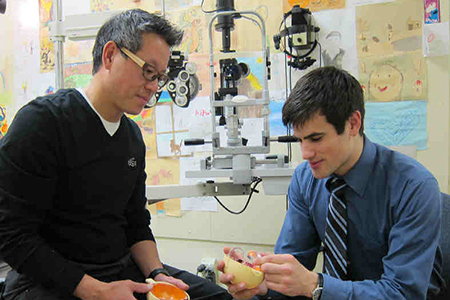Think Fast: What major can prepare you for everything from space travel to city planning?
With focus areas in aviation, infrastructure and beyond, engineering is a fascinating field of study that offers tons of opportunities for hands-on learning and career exploration.
If you’ve got a mind for math and science and crave challenging work plus great pay, pursuing an engineering degree might be the perfect next step on your academic journey.
So, what does it take to get accepted to a college or university with a great engineering program? And what can you expect once you start pursuing your major? Read on for insider tips from universities across the country, and get ready to join one of the fastest-growing, highest-paying and, dare we say, coolest fields around.
WHERE CAN ENGINEERING TAKE YOU?
A degree in engineering offers a near limitless range of employment opportunities, depending on your specialization area. Business Insider recently published a list of the top 20 highest-paying jobs for engineering majors and included everything from work in the naval industry to information technology*. Many different career options open up with a degree in engineering, and a wide variety of majors are available for you to pursue, such as civil, computer, electrical and mechanical engineering.
VK Sharma, dean of the Allen School of Engineering at Trine University (IN), recommends that curious would-be engineers use YouTube to find videos on what different engineers actually do in the field. Sharma acknowledges that it can be tricky for young people to identify exactly what engineering entails, but makes clear that being an engineering major has “less to do with hard hats and greasy hands under a hood, and more about harnessing your intellectual horsepower.” In other words, an engineering major will push your math and science abilities to the limit, and the career possibilities that follow will also rely on critical thinking skills and sound logic to solve sophisticated problems.
The post-graduate outlook after majoring in any engineering field looks bright. “At Embry-Riddle, our focus is on aviation and we’re seeing a great need for graduates to help figure out what the future of aviation looks like,” says Chris Grant, associate dean of the College of Engineering at Embry-Riddle Aeronautical University (FL). “The rising costs of fuel and the shifts towards privatization in space flight means tomorrow’s engineers will be helping to innovate designs and systems for the future of aerospace and aviation.”
BUILDING YOUR FOUNDATION NOW
Math and science are the keys to unlocking a successful career as an engineer, no matter the specific engineering field you want to pursue. “Taking a pre-calculus or calculus course in high school will better prepare students for Calculus I-III in college,” says Lauren Willison, director of admissions at Florida Polytechnic University. “Future engineering students should also take chemistry, physics and biology while in high school. Florida Poly encourages students to take advanced courses while in high school, such as AP, IB, AICE or dual enrollment. Advanced courses show college admissions offices that you are ready for a difficult college curriculum.”
But don’t discount the importance of your other academics in favor of math and science. Frederick Driscoll, dean of the Wentworth Institute of Technology (MA) agrees. “In terms of classes or clubs at school, recommendations would be math, science and robotics, but good communication skills (oral and written) are extremely important. Students need to be curious of why and how things work and develop good time management skills.”
BEYOND THE CLASSROOM
If you’re a solid math and science student interested in engineering, a great way to test the waters while helping to shore up your college application is by trying out an internship, summer enrichment program or job shadowing program to get a feel for what being an engineer is really like. This experience will give you the opportunity to learn more about engineering.
Embry-Riddle’s Grant says that incoming students should expect to be involved in hands-on learning opportunities right from the very first year they arrive on campus. “Students get a lot of value from participating in research projects and attending annual industry meetings and competitions. Not only do these projects provide immediate experience in engineering, but they also develop the teamwork skills early on that are needed in the industry, plus connections with other students and a sense of community within the engineering program.”
At Wentworth, students are required to complete two semesters of co-op education. In addition, “student design teams are encouraged and sponsored to compete in different design competitions, both regionally and nationally,” says Driscoll.
INTERNSHIPS, ENRICHMENTS AND PROGRAM OPTIONS
So what lies ahead if you do decide to pursue engineering at the college level? Thanks to the major demand for engineering talent, more and more higher institutions are partnering with companies and researchers to create opportunities for hands-on engineering work that’s built right into your course load.
At Embry-Riddle, engineering students are thrilled to be at “the only university in the country that has students competing in all five intercollegiate robotics competitions and also in NASA’s Lunabotics Mining Competition,” says Deborah Bandy, director of strategic marketing initiatives. “Also, we are among only 16 universities participating in EcoCAR3, sponsored by General Motors and the Environmental Protection Agency.”
Florida Polytechnic University’s first-year students participated in a “Shark Tank” scenario, presenting their problem-solving inventions to an industry review panel. “These students worked throughout their first semester creating different solutions and inventions such as a noise reduction system for loud, open-concept offices; building materials that allow for better Wi-Fi transmission; and wearable energy-harvesting technology for backpackers,” says Willison. “The winning groups were awarded entrepreneurial support from the university, including a provisional patent finding. Students who major in engineering have a real-world application of engineering in their first semester as a college student at Florida Polytechnic University.”
During your application process, be sure to ask the admissions representatives about opportunities for hands-on research or internships in the engineering department. Your enthusiasm and interest in experiential work will help set your application apart from the pack.
TOMORROW’S TRENDS
The diverse fields of engineering offer countless opportunities for talented, curious students. Sharma of Trine points out that “nearly everything we touch or use has involved an engineer. When you brush your teeth, everything from the toothpaste cap to the flow of hot and cold water has required the work of an engineer. There are lots of openings to innovate right now. We need engineers to develop hybrid vehicles, to work on fuel cells and sustainable energy options like wind, water and solar. We need engineers to create a cleaner environment, lighter materials, improved highways, secure defense systems—really, your options as an engineer today are unlimited.”
Driscoll agrees and explains that engineers will be working and collaborating across all fields—from science research, sustainability and transportation to finance, cybersecurity and communication. “Some of the areas in which engineers will be employed are making alternative energy economical, working to reduce the carbon footprint from all sources and improving health care by [creating] new and better medicines, equipment and telemedicine.”
KNOW YOUR OPTIONS AND GET ON TRACK
If you think engineering is for you, take the next step: visit schools and talk to the professors and students at each institution to get a sense for where your interests might best fit. Learn about the research students are working on, and identify whether or not you see room to explore the curiosities that drive you. If you have the skills and interest to become an engineer, you’ll not only help people improve their lives, but also earn some of the highest starting salaries of any college graduates.
For more information, check out www.justcollegeguide.com and type in “engineering.”
*Source: Business Insider, April 2015: www.business insider.com/the-highest-paying-jobs-for-engineering-majors-2015-4
Caitlin Corrigan is a freelance writer living in Portland, Maine.



